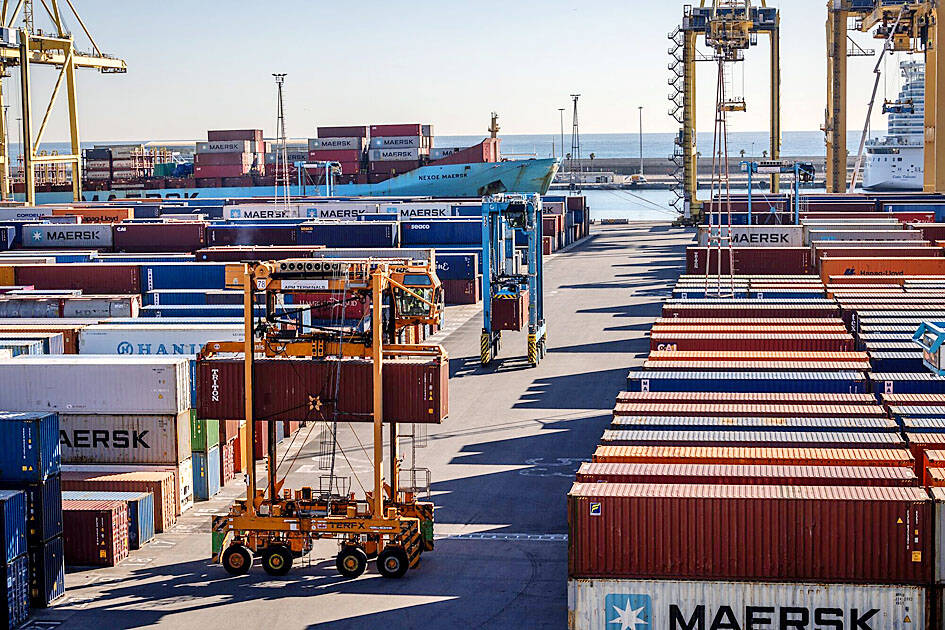Members of US president-elect Donald Trump’s incoming economic team are discussing slowly ramping up tariffs month by month, a gradual approach aimed at boosting negotiating leverage while helping avoid a spike in inflation, people familiar with the matter said.
One idea involves a schedule of graduated tariffs increasing by about 2 percent to 5 percent a month, and it would rely on executive authorities under the International Emergency Economic Powers Act, they said.
The proposal is in its early stages and has not been presented to Trump, they said.

Photo: Bloomberg
Advisers working on the plan include Scott Bessent, the nominee for Treasury secretary, Kevin Hassett, set to be director of the US National Economic Council, and Stephen Miran, nominated to lead the Council of Economic Advisers, they said.
The US dollar fell against almost every major currency and US Treasury yields dropped yesterday after the report.
During last year’s presidential campaign, Trump floated minimum tariffs of 10 percent to 20 percent on all imported goods, and 60 percent or higher on shipments from China.
Since he won the election in November, multiple reports have emerged on how aggressively he would implement tariffs — with Trump himself calling one report of a measured rollout false.
With just a week until the inauguration day, economists can only guess as to how Trump’s trade wars would influence the US economy. That has left a complicated picture for the US Federal Reserve, because Trump’s tariff threats are seen as a risk to the growth outlook while potentially stoking inflation if nations retaliate.
UBS AG global head of economics and strategy research Arend Kapteyn said a decision by Trump to ramp up tariffs gradually once he takes office would be “problematic” for the Fed as it battles the last mile of inflation.
“We think of tariffs as a one-off price level shift, and then it goes away a year later, and then provided it’s not big enough you don’t have spillover effects so you don’t get second-round effects that are sort of inflationary,” Kapteyn said yesterday in a Bloomberg television interview in Shanghai.
“But if you do rolling tariffs, it’s a little like the repeat of the [COVID-19] pandemic and the Ukraine shock that we had, you have one supply shock after another and you start to create a much higher peak in inflation, so I think much more difficult to sort of know what to do with that as a central bank,” he said.

Quanta Computer Inc (廣達) chairman Barry Lam (林百里) is expected to share his views about the artificial intelligence (AI) industry’s prospects during his speech at the company’s 37th anniversary ceremony, as AI servers have become a new growth engine for the equipment manufacturing service provider. Lam’s speech is much anticipated, as Quanta has risen as one of the world’s major AI server suppliers. The company reported a 30 percent year-on-year growth in consolidated revenue to NT$1.41 trillion (US$43.35 billion) last year, thanks to fast-growing demand for servers, especially those with AI capabilities. The company told investors in November last year that

United Microelectronics Corp (UMC, 聯電) forecast that its wafer shipments this quarter would grow up to 7 percent sequentially and the factory utilization rate would rise to 75 percent, indicating that customers did not alter their ordering behavior due to the US President Donald Trump’s capricious US tariff policies. However, the uncertainty about US tariffs has weighed on the chipmaker’s business visibility for the second half of this year, UMC chief financial officer Liu Chi-tung (劉啟東) said at an online earnings conference yesterday. “Although the escalating trade tensions and global tariff policies have increased uncertainty in the semiconductor industry, we have not

Intel Corp has named Tasha Chuang (莊蓓瑜) to lead Intel Taiwan in a bid to reinforce relations between the company and its Taiwanese partners. The appointment of Chuang as general manager for Intel Taiwan takes effect on Thursday, the firm said in a statement yesterday. Chuang is to lead her team in Taiwan to pursue product development and sales growth in an effort to reinforce the company’s ties with its partners and clients, Intel said. Chuang was previously in charge of managing Intel’s ties with leading Taiwanese PC brand Asustek Computer Inc (華碩), which included helping Asustek strengthen its global businesses, the company

Power supply and electronic components maker Delta Electronics Inc (台達電) yesterday said it plans to ship its new 1 megawatt charging systems for electric trucks and buses in the first half of next year at the earliest. The new charging piles, which deliver up to 1 megawatt of charging power, are designed for heavy-duty electric vehicles, and support a maximum current of 1,500 amperes and output of 1,250 volts, Delta said in a news release. “If everything goes smoothly, we could begin shipping those new charging systems as early as in the first half of next year,” a company official said. The new